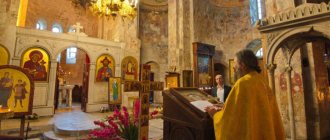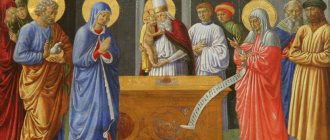The Kingdom of heaven!
“The Kingdom of Heaven and Eternal Peace!”
“Blessed memory and the kingdom of heaven!”
- words of condolences and oral epitaph among Orthodox Christians.
According to Orthodox beliefs, the first forty days after death the soul of the deceased:
On the 40th day, the soul of the deceased appears before God's judgment. The Lord decides the fate of where the soul will be - in Heaven or Hell.
Prayers for the repose of the soul and appeals to the Lord for forgiveness help the deceased. Therefore, during the first 40 days and at the funeral of the 40th day - especially - when remembering the deceased, Orthodox Christians cry out to the Almighty:
- The kingdom of heaven and eternal peace! or - The Kingdom of Heaven and Eternal Memory!
This distinguishes the etiquette of funerals and condolences among the Orthodox from the secular traditions of commemoration, where “May the earth rest in peace!” - the most common oral epitaph and funeral toast.
Postcards-pictures “Kingdom of Heaven!”
Funeral cards with pictures and inscriptions “Kingdom of Heaven” or “Kingdom of Heaven and Eternal Peace!” designed so that they can be transmitted via SMS, Whatsapp, Telegram, Skype, Email. On the recipient’s phone, the postcard will be displayed correctly, like the words of an Orthodox Christian. Complete the message with a few words from yourself!
Which is correct?
"Kingdom of Heaven" or "Kingdom of Heaven"?
How to write correctly?
“Kingdom of Heaven” - this word form was used in the Old Russian language, and its roots go back to the Holy Scripture. Dictionaries define the word “kingdom” as a church-bookish, outdated lexeme. The modern analogue of the word “kingdom” is “kingdom” .
The emphatically outdated “kingdom” defines the speaker as a Christian who adheres to the canons of the church.
In Orthodox mourning etiquette, rituals are significant.
Online memorial - continuation of the granite monument
✒ How to write an obituary and publish it for free
Epitafii.ru - the most beautiful collection of inscriptions on the monument.
Source
Soul after death
According to Orthodox doctrine, in addition to the physical body, a person also has a spiritual, invisible essence - the soul. It is given by God at the birth of a person in the womb and continues to exist independently after the death of the body. The posthumous fate of the soul is determined by its spiritual state. That is why the question of how to correctly wish for the Kingdom of Heaven is relevant.
Life “beyond the grave” is determined by the way a person lives on earth. Did he strive for salvation, did he try to keep God’s commandments, did he repent of his sins. A pure, righteous soul carries within itself the Divine image. She is with God, to whom she longed. A soul polluted by sins is likened to demons who have fallen away from God. She cannot be close to the Lord, because she has always resisted Him. Dark forces take such a soul to themselves. After all, she was in their power even in earthly life.
One of the images of the Kingdom of Heaven (cartoon “The Extraordinary Journey of Seraphim”)
How to properly wish for the Kingdom of Heaven
So, after death, the soul cannot change anything on its own. But the relatives and friends of a deceased person can help his soul. To do this, you need to pray, ask God for the forgiveness of her sins.
“In life, the king’s earthly friend may intercede with him to help some condemned person. Likewise, if a person is a “friend” of God, then he can intercede with his prayer before God” (Rev. Paisius the Svyatogorets, “Words.” Volume 4).
After death, only a private, preliminary judgment of the soul occurs. It shows how deeply rooted passions are in a person’s soul and how close he was to God during his lifetime. A private court determines the soul to the “place” that most corresponds to its condition. Heaven is the afterlife with God. Hell is the absence of God. Being close to God for an unrepentant sinner would be even more unbearable than being in hell. There is no intermediate, neutral state of soul in Orthodoxy. Unlike Catholicism, which has the concept of purgatory.
However, just as in heaven there are different degrees of closeness to God, so in hell souls suffer in different ways. The final Last Judgment will occur at the end of time after the Second Coming of Christ. The prayerful care of living people can not only ease the preliminary fate of the soul. She is capable of serving as her justification at the coming terrible Judgment. Therefore, to the question of how to correctly wish the soul the Kingdom of Heaven, the answer is through church and home commemoration.
“Just as when we visit prisoners, we bring them soft drinks and the like and thereby alleviate their suffering, so we alleviate the suffering of the deceased with prayers and alms that we perform for the repose of their souls” (Reverend Paisius the Svyatogorets, “Words.” Vol. 4)
How does the church look at the death of a person on Easter Day?
Unlike the laity, some of whom may consider death on the main Orthodox holiday to be the great good of the Lord, who grants salvation to the soul of the deceased and frees him from the Last Judgment with ordeals, church ministers do not support such a point of view.
All representatives of the church rely only on the official scriptures, which say that all souls of the departed must go through God's judgment, repent and be cleansed of the sins of earthly life. The Bible does not contain any other instructions related to death on Easter Day.
How to pray for the deceased
In Orthodoxy, in the first days after death, the Psalter (or the Gospel, if the deceased was a priest) is read over the body of the deceased. On the third day, the deceased is remembered with a funeral service and buried. The reading of the Psalter continues after the funeral until the 40th day. The church service for the deceased is called a memorial service. It is performed on the day of the funeral, on the third, ninth, fortieth day of death. A memorial service is also served on the anniversary of the death or birth of the deceased. The relatives of a deceased person can order his forty-day commemoration at the Divine Liturgy, which is called forty-day. During each liturgy, the remembrance of the dead is performed at the proskomedia. You can pray for the repose of your soul at home. The prayers necessary for this are in every prayer book.
The days of special remembrance of the dead in the Orthodox Church are:
“May he rest in peace” is not a remembrance
Why can’t you say “may the earth rest in peace” as a wish for the deceased? Such a wish has nothing to do with Christian commemoration. The phrase itself takes roots from paganism and implies a wish for a dead body, and not for the immortal soul of a person. But it is the fate of the soul that is most important. Therefore, Orthodox Christians should remember the deceased with home and church prayer and say: “The Kingdom of Heaven to him/her.” You can also help the deceased by giving alms for the salvation of his soul.
Christians should not accompany burials and wakes with superstitious customs. These include, for example, lowering candles, money, and various objects into the grave with the coffin. This is a pagan tradition based on the belief that material benefits can be useful to a person in the afterlife. By putting foreign objects in the coffin, people try to please the deceased. However, they forget that the soul only needs prayerful consolation. Everything material loses its meaning for her.
Funerals cannot be turned into feasts with alcohol and drunkenness. Archpriest Viktor Guzenko answers the question about alcohol at funerals:
“What good can a soul do when they drink vodka for it? A funeral dinner is a type of alms offered for the repose of the soul. And besides, from a purely human perspective, there can be an extremely unsightly picture when some of the guests are so “reminded” that they sing songs, tell jokes, and laugh when close relatives of the deceased are in grief. Both from a Christian point of view and from a human point of view, alcohol is inappropriate at a funeral.”
At a wake, there is also no need to place separate cutlery “for the deceased” or a glass of vodka in front of his portrait. And instead of wishing “rest in peace,” it is better to cross yourself and sincerely pray for the repose of the soul of the deceased.
There is a version that if a person dies on Easter, he immediately goes to heaven...
Archimandrite Ambrose (Yurasov) answers questions from listeners of Radio Radonezh. Presenter: Hierodeacon Eleazar (Titov)
-Christ descended into hell to bring out all the righteous from there. And all those who wanted to follow Christ followed. And those who did not want to go with Christ, to come out of hell, remained. Father, how can this be? Look, someone has gone to hell. Christ came to lead him out of hell - but this someone still wanted to stay there?
-Those people who were embittered - during their lifetime they did not see anything sacred and passed into the spiritual world the same way. They will be embittered there too. These people are as evil as demons and do not want to repent; they are in terrible embitterment and do not want to follow Christ.
-That is, Christ could lead demons out of hell?
-If they agreed, yes. The Lord gave man free will, and He does not violate this will. Therefore, during life, people begin to reveal themselves in love for God or in hatred of Him. A friend of mine has been going to church since childhood, and his uncle told him in his youth that there is no God, that everything was created by nature. Now he is already 70 years old, and he is against God and the church. Even through his relatives they gave him a book: “For God is with us,” but he did not read it. Threw it away. He's so angry. And of course, only the prayers of his parents could help him. But his mother committed suicide. So the man was unable to repent.
So, on Radunitsa the Orthodox Church commemorates everyone who does not oppose this. With God everything is possible.
-Father, there is a version that if a person dies on Easter, he immediately goes to heaven, bypassing the ordeal.
-This is not written anywhere in the Holy Scriptures. People come up with this to ease their inner state. It is said that nothing unclean will enter the Kingdom of God. Only those who have repented, corrected themselves, cleansed their soul, and filled it with grace enter there. The Lord says: “Whatever I find you in, that’s what I will judge.” What if on Easter the Lord found a man who had been swearing and getting drunk all his life? Drunkards will not inherit the Kingdom of God - this is so determined. And no one will enter heaven just like that.
-Okay, father, tell me how to avoid all this? So that the soul does not become embittered against God?
-We have to come to terms with it. Because if we are in pride, then we become like not God, but the devil. Because the Lord said: “Learn from Me that you are meek and humble in heart, and you will find rest for your souls.” And when a person is proud, but there is nothing to be proud of. Let's say I ask: who created the earth? - Lord, who created man from the earth? - Lord, who gave the immortal soul and all the abilities? - Lord, what remains for us? - only sins. But it is unreasonable to boast about sins. Yes, if we consider ourselves a bag of shit, that’s normal. Sometimes this bag can stink like that if you touch it a little. But you can simply work on yourself and achieve such a state that there will never be any anger, no resentment, no evil, no pride in your soul. There will always be silence, peace and tranquility if we surrender ourselves into the hands of God. Because God guides us. God's providence is everywhere, especially when a person strives for God.
Tel. call: I was at the cemetery. There are a lot of people. Lots of elderly people. Transport was not organized. Old people walk. Cars with empty seats drive by, and no one will give you a ride. This is what is happening to us?
-Everything is provided by God. Sparrows flew into the prophet David's window and dropped droppings right into his eyes, and he became blind. Didn't the Lord know? He allowed it. In order for David to develop patience and gratitude to the Lord. And what happened at the cemetery is because we do not raise our children in the Orthodox spirit - this is their attitude towards their parents. Even better: many rich people put their parents in nursing homes. And all Orthodox Christians watch them to the end.
Tel. call: -How to help a person who is embittered?
-Only prayer works miracles. You just need to pray internally in your own words, tell the Lord, as a dear Father, all your soul’s pain and leave everything to the will of God. Otherwise you can't do anything. Some say: Father, how can I get my son to church? I say: take a bulldozer, a rope around his neck, and drag him there. But this is impossible! He has his own free will, and the Lord is waiting for him when he comes and repents. We must ask our neighbors to pray, order magpies to monasteries and churches. You can especially remember when we read the Gospel, you can remember in the chapters. And you can pray separately. After all, every prayer reaches God. And, of course, learn to pray. How one monk had a headache, and everyone asked - how did you learn to pray? He says: it’s very simple - when headaches start, I start praying, the pain goes away. I stop - it hurts again. And so I have to pray incessantly throughout the day. In this way a person taught himself to pray. And the holy fathers say: if there were no demons, not a single person would be saved. Demons attack - and we fight them. And God helps. Only we very rarely turn to God for help. Well, let’s say one monk was praying in his cell. And the demons constantly annoyed him, they appeared directly. And then it got to such a point that they grabbed the monk by the hands and began to push him out of his cell. He ran into the walls and shouted: Lord, help me!! Suddenly: hurr! - and everything disappeared. And the monk says: Lord, why didn’t you help me before? And the Lord answered: you did not turn to Me. As soon as you turned, I helped you. We must constantly turn to God. Of course, the demon inspires people - why bother God and constantly turn to Him? But that’s why He is God. Let’s say 7 billion people now live on earth, if everyone talks around the clock, then God will hear everyone. If all the saints in heaven turn to God and all the angels, He will hear everyone. We liken God to ourselves. And God is the purest spirit, God is love. You can’t think about God that a grandfather with a beard flies and rules the world. So you can pray to God constantly. Therefore, the Apostle Paul says: pray unceasingly, always rejoice, thank God for everything.
Tel. call: -If I want to go to a monastery, but my parents are against it, what should I do?
- There was such a case. One old man and his disciple went out and looked at the stream of demons, like black clouds, flying. And the elder says: I conjure you by the living God, tell me where are you flying? One demon paused and said: in such and such a village, a girl was getting ready to go to a monastery. The elder takes the disciple, they rush there, the whole village is filled with demons. He opens the house, and there are tons of them in the house, and the girl is sitting with her head bowed, sleeping. And the demons say to her: stupid, why are you going to the monastery? Just look how many people live in the world and are superior to monks. The elder made the sign of the cross - and all the demons flew out of the house. He stepped on the tail of one at the door and detained him. And the girl woke up. She says: I was planning to go to the monastery, but now I changed my mind. And the elder told her: these are your enemies, and pointed to the demon. But I don’t see the girl. Then the elder said: let’s pray, and her spiritual eyes opened, and she saw a terrible, ugly demon. So let no one think that everyone will become a monk. Those whom the Lord has called will go. St. Seraphim of Sarov says that if you are tied up and brought to the monastery, this is the will of God. That is, we must thank God and rejoice. Because the last days of life will show the results themselves. And the myrrh-streaming Nile taught: the Holy Scriptures say that the third part of the angels fell from heaven. This world will stand until the number of fallen angels is replenished. Since the monastics take on the angelic image, they are the ones who fill the places of the fallen angels. So we must thank God if the Lord called someone to this path. If the Lord called, then the Lord will help. You just have to work hard everywhere.
Tel. call: - Difficult situation at home. My relationship with my son is terrible.
-How can you understand that the Lord has called you to monasticism?
-When they come up to me and ask me what to do, how to pray so that my son or husband doesn’t drink? I say: dear mother, all of Russia drinks. Everyone suffers and suffers. We took such a cross upon ourselves without raising our children. And we are reaping the fruits. Because if there is no Christ in this heart, it means that an evil spirit lives in it. And when a person is peaceful, calm, balanced, such a person has the Holy Spirit within him. And if not, there is an evil spirit there, and these evil actions manifest themselves in him. A mother's prayer shakes the heavens and reaches God. And if you pray, you will have peace and quiet in your soul. Although there will be Sodom and Gomorrah around. The most important thing is that you get out of this state and don’t pay attention. You have learned patience and humility, and God will intercede and help you.
As for vocation, live like a monk. Don't eat meat, pray harder. And you will be under special protection.
Phone call: -The church has been praying for the dead for millennia. The saints, of course, have a straight path. But those who reside unknown where? And are there any signs that the prayer for the departed has been heard? I'm not talking about conducting. But exactly how to make sure? And only monks can beg - or lay people too?
-Well, let's put it this way. The holy soul or sinful soul left the body into the spiritual world. Man no longer has his own will there. He would be glad to appear to his relatives, but he does not have his own will. When we have our own will, then when there is a general resurrection. When the soul unites with the body, then it will have its own will. Now all the departed, saints and sinners, are all waiting for prayers. If a person lives a righteous life, and the soul entered the spiritual world in a blissful state, it will remain in a blissful state. If they pray for this person, then it will be good for him. And it was good and it will get even better. And if a person does not find himself in spiritual joy, but finds himself in a difficult unrepentant state, then there will be darkness, despair, despondency in his soul, and this person awaits the prayers of the church. If a Divine service is being held in a church and an offering is made for a proskomedia or mass, then this name is commemorated. Example - one man worked in the mines, he was paid in gold, and one day he came on vacation and gave part of the gold to the priest for the temple. He says: Father, while I’m alive, pray and then don’t forget. The priest prayed, remembered, and the next day the priest died. And this Christian was in a panic: the gold was missing, and he grieved so much that an angel appeared to him and showed him the scales; on one side they put the gold, which he gave to the priest. But the priest mentioned you at the liturgy - and instantly it all changed. So your gold is nothing before God, but one particle taken out for health or peace - it brings great benefit. Angels carry this particle, dipped into the Blood of Christ, after the Liturgy on a board to the soul of a person who is in a dark place, and for this soul it is a huge help. From one layer of flour it passes into the second, lighter layer. So the holy church prays. And at the memorial service he is remembered, this is also a big help. Especially the parents. This is joy. The deceased is someone who has fallen asleep for a while and has passed on to another world. So the prayer of the church is of great benefit. He cannot pray for himself, but prayer saves everyone, like someone who has fallen on a stretcher.
-There are three categories in heaven. The first is those who were united with Christ, those who lived here in such a way that they bore fruit a hundredfold. They loved God with all their soul, with all their heart, while still living here on earth. And they will have heaven in heaven.
The second category is the saved. These are the people who strived for God, but at the same time were guilty of sins. And then they repented, then they sinned. Their fate is such that they will inherit the earth, a new one, a different one, which the Lord will create.
And the third category of people is those who have been pardoned. These are those who did not strive for God and lived somehow. But through the prayers of their relatives and the church, the Lord had mercy on them.
How to find out where a person is? You know, our main task is to pray. After all, when we pray, we do good not only for them, but also for ourselves. After all, when we pray, we accustom ourselves to prayer, and grace is also given to us. Therefore, we must pray until the end of our days. How to find out? When our soul leaves our body, then we will find out.
-We don’t need to believe dreams after a person’s death. That he dreamed that he felt good there, and he was so good. Even demons can show this.
We must pray!!!
Tel. call: - Do the deceased hear our prayers? And is it possible to contact them? They are not saints, so they should pray for us!
-All the dead hear everything. And they know how we live. And they hear our prayers. They cannot pray for themselves. We can do it for them. Therefore, we must especially ask for attention, especially when the soul has just entered the other world. She is uncertain. Will be determined on the 40th day. And what she has earned in this life will be rewarded or punished. Although it must be said that those passions that we acquired in this life - pride, anger, evil, irritation, if we have not overcome them here - they go with us to the next world. The Lord will not punish us, the Lord is love. And our passions will punish us. When they multiply a thousand times, they will torment us. The Lord never torments anyone and tolerates everyone.
Tel. call: - I’m reading litia at the cemetery. What is the difference between reading at home or in a cemetery? Where do they hear us better? Is there some kind of paganism in the fact that they will hear me better in the cemetery?
-No, mother. After all, everyone who has passed on to the next world is buried in the cemetery, there is a cross there, and they know in spirit that you have love for him. That you came to him. Great joy for them. Like, let’s say, a person is sick, and you come to the hospital to visit him. It's a joy! It is the same in the spiritual world. The state we are in now is the same we will be in in the spiritual world. It must be said this way: we will not change even one hair when the Lord calls us to account. As we were here, we will be there. Therefore, there is only one goal: try to pull yourself together and not give free rein to your feelings and your language.
Tel. call: - My husband died. He was a drunkard and angry. I pray. But you said that such people will not inherit the Kingdom of Heaven. What should I do?
- He doesn’t inherit. But we must pray. This does not mean that through our prayers they cannot be saved by God and be in the Kingdom of Heaven. Therefore, you need to pray. They carried him onto a stretcher.
Let’s say we sent a parcel to someone in need, he received it and is happy and understands that even though he is far away, they remember him there and constantly send parcels so that he can live here. Likewise, the departed rejoice, because through the prayers of the church they are given grace there.
How a person is in an investigative cell. Some relatives come to visit, while others have no one.
Sometimes when a person is begged for, it is not the person himself, but an angel in the form of that person who appears and thanks for the prayers.
Tel. call: -If the body was cremated, do prayers reach it in the same way as others?
-They're getting there. Because many people have drowned, been eaten by animals, burned, or been torn apart by a mine. God sees everything, knows everything. You need to pray, general prayer helps. And what happened to the body at death does not in any way affect what will happen to the soul.
Word of consolation: I wanted to remind you of the proverb: lost wealth - lost nothing, lost health - lost half, lost faith in God - lost everything. And good words from Basil the Great. He says: if a person is given all the riches of the world and made a king, the soul will not be satisfied. She can be satisfied only in God alone. Found God - found EVERYTHING. God is the source of joy, life, grace, love! If someone suffers, suffers, he suffers without God, because you can’t buy joy anywhere. And the Lord gives this joy through repentance, through the holy temple. Elder Paisios said: there are three obediences. The first is to preserve Orthodoxy and pass it on to your children and grandchildren. The second obedience is to constantly repent throughout the day of what you have sinned: Lord forgive, Lord have mercy. The third obedience is to adhere to the Church Sacraments and participate in them. This is the path to salvation in Christ. God help you, my dears.
Prayer for peace
You can wish the Kingdom of Heaven to the deceased with the following words:
“Rest, O Lord, the soul of Your newly departed servant (name), and forgive him all his sins, voluntary and involuntary, and grant him the Kingdom of Heaven.”
You should pray for the deceased like this:
“Rest, O Lord, the soul of Your newly departed servant (name), and forgive her all her sins, voluntary and involuntary, and grant her the Kingdom of Heaven.”
This prayer is accompanied by the sign of the cross. It must be said before eating the funeral meal. A brief commemoration of the deceased with the words “Kingdom of Heaven” with the sign of the cross is also allowed. You can also pray for the repose of the soul by reading from the prayer book “Following the departure of the soul from the body” or “Canon of prayer for the separation of the soul from the body.”
Source
Why can’t we say may the world rest in peace?
The phrase “may the earth rest in peace” is a common cliché that can often be heard at funerals from a variety of people, but never from a priest. And probably each of us at least once in our lives said these words, remembering those who have passed away. I spoke without thinking at all about the real meaning of this phrase, I spoke with the best intentions, but did we do the right thing?
Is it possible to wish “rest in peace”
When a person says: “May the earth rest in peace,” he strives to wish the deceased a better “life” after death. But such an expression cannot be used, especially in relation to an Orthodox person.
If we turn to the origins of this phrase, there are two different interpretations of its meaning:
- It is believed that this expression was pronounced over the grave of an enemy. Such a wish served as a curse, a wish that not a trace of a person would remain after his death.
- The second option relates to pagan beliefs. It was assumed that a person could rise from the grave at the time appointed for him. Therefore, there should not be a hard and heavy layer of earth above it.
Origin of the expression “May the earth rest in peace”
In ancient Rome, the phrase “May the earth rest in peace” was a common wish. It can often be found on ancient graves in the form of an epitaph. She promised a person an easy afterlife and was a kind of blessing to the deceased.
However, some consider this phrase a posthumous curse on the enemy, apparently basing their opinion on the lines of the ancient Roman poet Marcus Martial who wrote:
May the earth rest in peace to you, And softly cover the sand so that dogs can dig up your bones.
However, the widespread use of this phrase in those days suggests that it was not a curse. Rather, it corresponded to the modern phrase “Rest in peace.”
Origin of the expression and its meaning
Often in Russian speech, stereotyped phrases are used, the cliché meaning of which is not given importance. The fact is that the expression “May the earth rest in peace” has nothing to do with Orthodoxy. During funeral services and commemoration of the deceased, a Christian priest never uses it.
In Russian, the phrase has been preserved since pagan times. Then people did not yet know about the immortality of the soul, so they wanted to put the deceased to rest with maximum comfort, believing that his spirit would remain with the body. Along with the deceased, jewelry, clothing and other items “necessary” for the afterlife were placed in the tomb, grave.
In some cultures, it was customary to bury his servants, dogs, and even wives with the deceased. It was assumed that the deceased would be able to take advantage of all this, and to make it more comfortable for him to rest, they wanted “earth made of fluff.”
The phrase "May the earth rest in peace" was used to express respect for the deceased. Nowadays they say this, suggesting that they wish for the soul of the one who has passed on to another world that it will be gentle in heaven.
Is it possible to wish “May the earth rest in peace”?
Let's think about what exactly we are saying when we say this phrase. We express the desire for soft earth and comfort for the body of the deceased. But what is the body if not just a mortal shell, which after death is abandoned by the soul?
After all, Christian teaching says that after death the soul leaves the body and goes to the highest court, which will determine where it will stay in the afterlife, in heaven or hell. And by performing funeral rites, we show our faith in the resurrection.
You should not worry about the body abandoned by the spirit, you should worry about the fate of the Soul itself. Much more important to her are the prayers of loved ones, a memorial service held according to church canons, good deeds and good memory of the deceased.
What the priests say
Orthodox doctrine teaches us that the body is only a temple for the soul. When a person passes away, his bodily shell dies, but the soul continues to exist independently. By wishing for a person: “May the earth rest in peace,” we deprive him of the opportunity to find the “Kingdom of Heaven,” since we care about the body of the deceased.
Don’t wish to “rest in peace”, pray for the deceased to ease his fate
Christian teaching indicates that after death the soul cannot be reborn in another form. She ascends to heaven, where she will await the Supreme Judgment. Moreover, its fate will be determined not only by earthly deeds during a person’s life, but by the prayers of loved ones for the salvation of his soul.
Therefore, it is so important to pronounce the correct phrases regarding the deceased at funerals, wakes, and to conduct funeral rites in accordance with the canons of the Orthodox Church.
Important! The newly introduced one needs to say: “The Kingdom of Heaven,” thereby wishing him to be closer to God.
The Kingdom of heaven
According to Christian doctrine, the body is the seat of the soul, a temple that should be maintained in proper order. Including after death. Resurrection is one of the main dogmas of the church. And after the Resurrection, the soul will again be reunited with the body, wherever it is, and in whatever state it is.
Hence the careful, reverent attitude in church rites towards the body of the deceased. Hence the various funeral rites. But the soul is immortal.
The phrase “May he rest in peace” was inherited from paganism. But if many pagan rituals were quite successfully assimilated by the church, then this phrase contradicts faith, does not bring any benefit to the deceased and cannot be used. Instead, one should wish the deceased the Kingdom of Heaven .
Source
They say that those who die on Bright Week receive the Kingdom of Heaven. Is it so?
– The posthumous fate of the dead is known only to the Lord. “Just as you do not know the ways of the wind and how the bones are formed in the womb of a pregnant woman, so you cannot know the work of God, who does all things.”
(Eccl. 11:5). Anyone who lived as a Christian, committed works of faith, wore a cross, repented, confessed and received communion - by the grace of God, he can be granted a blessed life in eternity, regardless of the time of death. And if a person spent his entire life in sins, did not confess or receive communion, but died on Bright Week, can it be said that he inherited the Kingdom of Heaven?
If a person died in a continuous week before Peter's Lent, does this mean anything?
- It doesn't mean anything. The Lord ends the earthly life of each person in due time, providentially caring for each soul.
“Do not hasten death by the errors of your life, and do not attract destruction to yourself by the works of your hands.”
(Wis. 1:12).
“Do not indulge in sin, and do not be foolish: why should you die at the wrong time?”
(Eccl. 7:17).
Is it possible to get married in the year of your mother's death?
– There is no special rule in this regard. Let your religious and moral feeling itself tell you what to do. On all significant life issues one must consult a priest.
Why is it necessary to receive communion on the days of remembrance of relatives: on the ninth, fortieth days after death?
- There is no such rule. But it will be good if the relatives of the deceased get ready and partake of the Holy Mysteries of Christ, having repented, including of sins related to the deceased, forgive him all insults and ask for forgiveness themselves.
Is it necessary to cover the mirror if one of your relatives dies?
– Hanging mirrors in the house is a superstition and has nothing to do with church traditions of burying the dead.
The custom of hanging mirrors in a house where a death has occurred partly stems from the belief that whoever sees his own reflection in the mirror of this house will also soon die. There are many “mirror” superstitions, some of them are associated with fortune telling on mirrors. And where there is magic and witchcraft, fear and superstition inevitably appear. Whether a mirror is hung or not has no effect on life expectancy, which depends entirely on the Lord.
There is a belief that before the fortieth day nothing of the deceased’s belongings should be given away. Is this true?
– You need to plead for the defendant before the trial, not after it. Therefore, it is necessary to intercede for the soul of the deceased immediately after his death until the fortieth day and after it: pray and perform acts of mercy, distribute the things of the deceased, donate to the monastery, to the church. Before the Last Judgment, you can change the afterlife fate of the deceased through intense prayer for him and alms.
About help in various needs
________________________________________________________________________________
Why do people get sick?
– “He who suffers in the flesh ceases to sin, so that the rest of the time in the flesh he may no longer live according to human lusts, but according to the will of God.”
(1 Pet. 4:1–2). The Lord sometimes allows illnesses as a reason for repentance and an opportunity to correct the way of life, to understand that earthly life is a short moment, behind which there is eternity, and what it will be like for everyone depends on his life on earth.
Illness often becomes a reason to show love. Therefore, a sick person can, at the cost of his suffering, contribute to the salvation of relatives and loved ones.
Is it possible to be treated?
– “Honor the doctor according to the need for him, for the Lord created him, and healing is from the Most High... The Lord created medicine from the earth, and a prudent person will not neglect them... For this purpose, he gave people knowledge so that they would glorify Him in His wonderful deeds: with them he heals a person and destroys his illness"
(Sir. 38:1–2, 4, 6–7).
God created doctors and medicine. If illness had been welcomed by the Lord, then Jesus Christ would not have healed the sick. In the Holy Scripture we read: “And Jesus answered and said to them, Go and tell John what you have seen and heard: the blind receive their sight, the lame walk, the lepers are cleansed, the deaf hear, the dead are raised, the poor are preached to the gospel.”
(Luke 7:22). But the Lord does not just deliver from illness. He heals people. This means it restores the integrity of soul and body lost as a result of sin. Therefore, in case of illness, along with turning to doctors, one must go to church and pray to God to heal, that is, to forgive sins, which very often are the cause of illness, and through this restore the integrity of soul and body.
How to recover from illness?
– “Fear the Lord and shun evil: this will be health for your body and nourishment for your bones.”
(Prov. 3:7–8) The cause of many diseases of the body are diseases of the soul - sins. Therefore, first of all, you must repent of your sins, that is, confess and take communion, receive unction with the blessing of the priest, and order prayers for health. When you are sick, you should also not neglect medical care.
But if everything undertaken does not help, then illness must be treated as a cleanser from sins, as one’s cross.
Everlasting memory
Any memorial service for the deceased ends with the exclamations of “Eternal memory,” so it is logical to say this phrase when saying goodbye to a baptized deceased. A memorial service, a special prayer remembering the deceased, asking for forgiveness and granting him the Kingdom of Heaven, is read not only on the day of the funeral. In a church or at a grave, a priest can read it on the 9th and 40th day, on the year of death, on the birthday or name day of the deceased. At home or when visiting a grave, everyone can read the litiya - a shortened version of the memorial service. And on Parental Saturdays, parastases are held - a special type of funeral service, when all dead Christians are remembered.
The rite of requiem ends with the request: “In the blessed dormition, grant eternal rest, O Lord, to your departed servants, and create for them eternal memory.” Then “Eternal Memory” is repeated three times. In the rite of the memorial service there is also the phrase “Save and rest the soul of Thy servant,” which is also appropriate at the funeral and wake of an Orthodox Christian.
Peace to dust
“Peace be upon his ashes” or “Peace be with him” is a phrase that is appropriate when bidding farewell to a Jewish deceased. In Hebrew it sounds like “alav-ha-shalom” and, as follows from the book of Mishley by King Shlomo, it is pronounced every time to glorify the righteous and righteous life as such. The fact is that one of the names of the Almighty is Shalom, and it literally means “perfection” or “peace.” Therefore, when saying “Peace be upon your ashes” to a righteous person, it is meant that he has reached such a level of spiritual perfection at which, after his death, he will rest next to “peace,” with the Almighty. Those who hear “alav-ha-shalom” should follow the example of the mentioned righteous Jew and walk the righteous path through life.











